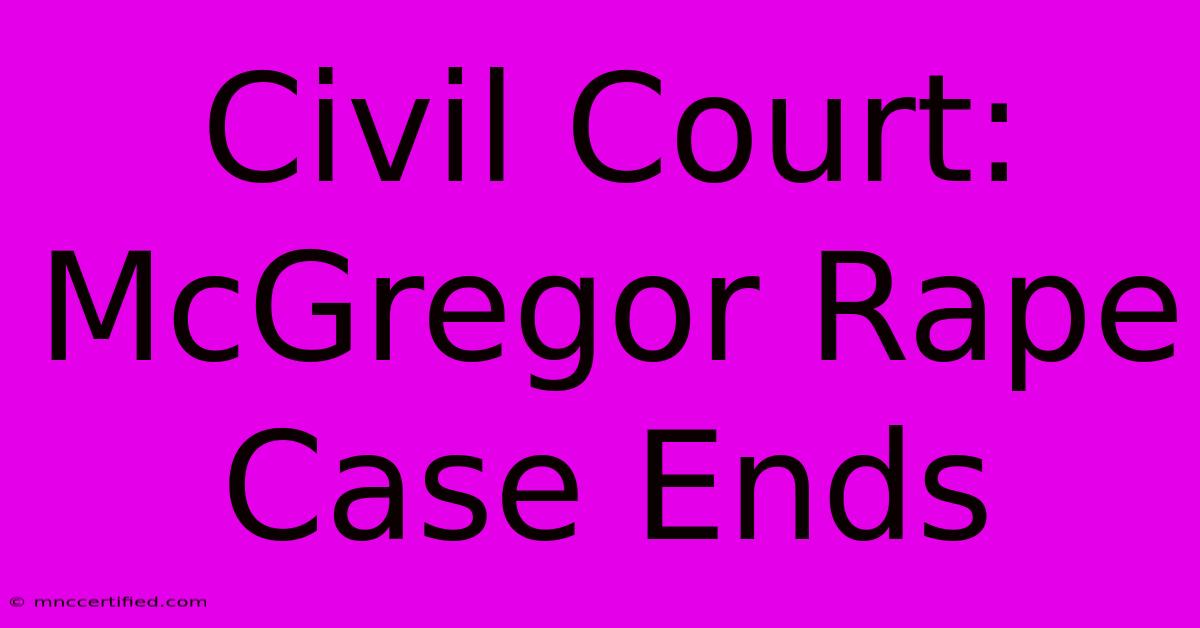Civil Court: McGregor Rape Case Ends

Table of Contents
Civil Court: McGregor Rape Case Ends – A Summary and Analysis
The highly publicized civil case against Conor McGregor, stemming from allegations of rape and sexual assault, has concluded. While the specifics of the settlement remain confidential, the ending marks a significant moment, raising questions about the complexities of civil litigation, especially in high-profile cases involving prominent figures. This article will delve into the key takeaways from the case's conclusion, examining its implications and broader context.
Understanding the Allegations and the Civil Process
The case centered around serious allegations of rape and sexual assault leveled against the UFC fighter, Conor McGregor. It's crucial to remember that a civil case differs significantly from a criminal case. In a civil case, the burden of proof is lower, and the goal is to determine liability and compensate the plaintiff for damages, not to determine guilt or innocence beyond a reasonable doubt as in a criminal trial. This distinction is vital in understanding the outcome and avoiding misinterpretations.
The plaintiff, whose identity remains protected, initiated the civil lawsuit seeking financial compensation for the alleged harm suffered. The details of the allegations, while publicly known to a degree, were largely presented during the proceedings, away from the glare of constant media scrutiny that often accompanies such high-profile cases.
The Settlement and its Implications
The conclusion of the case via settlement indicates that both parties reached an agreement outside of a full trial. The terms of the settlement, however, are confidential. This confidentiality is common in civil settlements and protects both parties involved from further public disclosure and potential reputational damage. While the lack of public details is frustrating for those seeking complete transparency, it's important to respect the legal processes involved and the privacy of those involved.
The settlement does not constitute an admission of guilt or liability by McGregor. It simply represents a resolution agreed upon by both parties to avoid the time, cost, and uncertainty of a full trial. This is a crucial point to understand: settlements are often reached to avoid the inherent risks and costs associated with litigation, even when one party believes they are in a strong position.
The Role of Media and Public Opinion
The case unfolded under intense media scrutiny, fueling public debate and speculation. The challenge in such high-profile cases lies in balancing the public's right to information with the need to protect the legal process and the privacy of those involved. The media's coverage played a significant role in shaping public perception, highlighting the complexities of navigating such situations ethically and responsibly. It's vital to rely on factual reporting and avoid making judgements based solely on sensationalized headlines.
The intense media coverage can be detrimental to both parties involved. This can impact the focus on the legal issues at hand and potentially influence the settlement negotiations.
Moving Forward: Lessons Learned
The McGregor rape case, regardless of its confidential resolution, offers valuable lessons. It highlights the importance of:
- Understanding the differences between criminal and civil proceedings: This is crucial to accurately interpreting outcomes and avoiding misleading conclusions.
- Respecting the confidentiality of settlements: The terms of such agreements are often protected for legitimate reasons.
- The significant role of media in shaping public opinion: Critical evaluation of news sources is essential.
- The complexities of high-profile litigation: These cases often require navigating unique legal and ethical considerations.
This case underscores the complexities involved in sexual assault allegations, the legal processes involved, and the importance of respecting the rights and privacy of all involved parties. While the details remain private, the conclusion provides a final chapter in a highly publicized legal battle. The focus should now shift towards fostering a deeper understanding of these complex legal issues and promoting responsible reporting.

Thank you for visiting our website wich cover about Civil Court: McGregor Rape Case Ends. We hope the information provided has been useful to you. Feel free to contact us if you have any questions or need further assistance. See you next time and dont miss to bookmark.
Featured Posts
-
Chemistry Ionic Bonds Worksheet
Nov 23, 2024
-
Return To Paradise Episode Guide And Filming
Nov 23, 2024
-
Gatwick Airport Bomb Scare Terminal Back Open
Nov 23, 2024
-
Licensed And Bonded Electrician
Nov 23, 2024
-
Ch3ch2 3coh Bond Line Structure
Nov 23, 2024